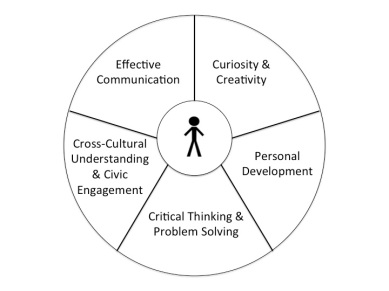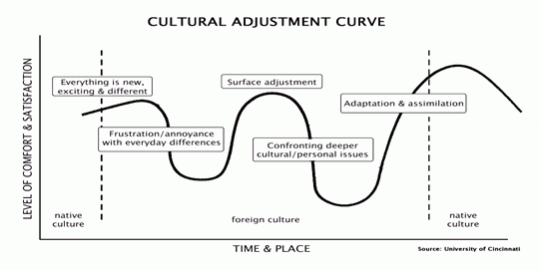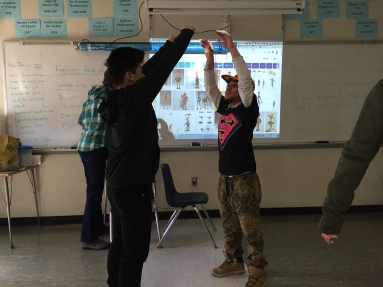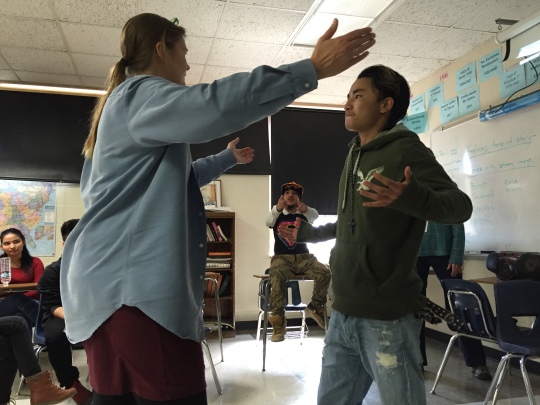A reunion to facilitate testing
Testing is never fun.
We are in the midst of a testing window, where we have to test every English Learner in all four domains: reading, writing, speaking and listening.
And for speaking, we can’t do more than 4 or 5 at a time, because otherwise the microphones will pick up the other voices in the room.
It’s a pain for us and a pain for our students.
But last week, Ms. Susan, our Flynn artist, came to play with us while my colleague Kevin was testing his class. He’d send the ones who weren’t testing to me while he grabbed a handful and put them through their paces.
Kevin’s kiddos, with very few exceptions, used to be mine. But their fluency improved and I sent them on to greener pastures.
The object of my class is to get students used to school and to bring them to a speaking/listening level where they can actively participate in a beginning class. They know basic directions. They know how to have the beginnings of a conversation with memorized phrases. They don’t look at you with that “deer in headlights” stare. When they are ready to leave my class, I know, because when the teacher says, “close the door,” they get it. When directed to turn to page 52, they know to grab their books. When they are asked to open their Chromebooks and check their email, they know what to do.
When they leave me, they go to Kevin, who begins focusing intensely on getting them to write, whereas my whole goal is speaking and listening.
All I can say is that I am so happy that we had a little time to play, to break through that frustration that comes with testing that is relentless.
We got to giggle a bit because some students (who were not with me, or not with me for long) have not figured out how to be silly in English. It all seems to be more than a little strange to dance and move and repeat words like “smooth” and “rough” or “fast” and “slow.” They get there, but in order to learn a language, you really have to be ready to let go of all those things that make you self-conscious.
And the same is true for drama in the classroom. If you can let yourself do things you normally don’t do, you can be brave.
Laughter lowers what is known in ESL circles as the “affective filter”: that barrier that gets in the way of learning. When the filter is high, it manifests itself in the need to close up your ears and run away. And that’s what we’re fighting.
Be brave, my young friends! Be brave by being silly!
 Having this big group back in my room was so delightful. We supported each other in making shapes, in putting movements with voice, in moving in silly ways. We reviewed the five senses and we talked about our emotions. Sort of.
Having this big group back in my room was so delightful. We supported each other in making shapes, in putting movements with voice, in moving in silly ways. We reviewed the five senses and we talked about our emotions. Sort of.
This is really what the Flynn involvement means to me: It’s a bridge to loosen up the tongue. It’s learning to fail and try again. It’s supporting strangers in a room who quickly become friends as they work to complete silly tasks. It’s being creative. It’s being brave.
When we look at graduation expectations (or GXs), pretty much everything we do helps move this group along the path. I should be sharing these videos with them as artifacts that they can show for meeting expectations:
- EFFECTIVE COMMUNICATION: We all have to talk to each other as we complete dramatic tasks, even if that task is as simple as a handshake or an introduction.
- CURIOSITY & CREATIVITY: Students try to come up with their own ways to do a handshake or put movements with their names. They have to be different than those that came before. Just like in language learning, we start by copying, just instead of words and phrases, we copy movements. But eventually, we make it our own.
- PERSONAL DEVELOPMENT: With bravery comes fluency. You just can’t help but be more comfortable after playing with the same people week after week.
- CRITICAL THINKING & PROBLEM SOLVING: On this day, we had to make groups build shapes. How would your group build a shape? Who would be the leader? Does this really look like the shape we’re trying to make?
- CROSS-CULTURAL UNDERSTANDING & CIVIC ENGAGEMENT: There are so many languages and cultures going on in that room at any one time. And there is always the issue of us doing some movement or saying some word that means something a little randy in another language… We are building understanding in the classroom so we can carry it over into the cafeteria. What could be more beautiful than that?
Check out the video below. I invite you to look for evidence of the graduation expectations I’ve noted above. The faces will change, but the activities remain the same. And the movements change, even if only slightly. Every change is leading to something that is uniquely their own.
It’s all about the baby steps.
The key to helping students with interrupted or limited formal education (SLIFE) move forward is to take what they know and add to the complexity. And that’s what we do.
The most beautiful part of this whole afternoon is how students resisted going to testing because they didn’t want to stop what they were doing. They really wanted to be there. Even if this doesn’t look like school to them. Even if it seems a little silly a lot of the time.
I’m grateful every time for the opportunity to make this magic happen!







 I’m going to Baltimore soon.
I’m going to Baltimore soon.



 So on Friday, we learned to take new risks with our Flynn artist Susan Palmer. We were letting others in the class be our puppeteers. We introduced the idea of a marionette to students and worked first on playing at being a marionette, then at letting someone else control us.
So on Friday, we learned to take new risks with our Flynn artist Susan Palmer. We were letting others in the class be our puppeteers. We introduced the idea of a marionette to students and worked first on playing at being a marionette, then at letting someone else control us.